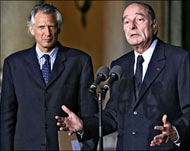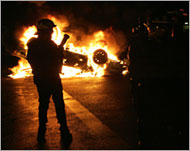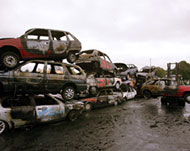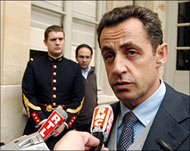Curfews planned in France to stop riots
France will impose curfews under a state of emergency law and call up police reservists to stop rioting that has spread across the country, Prime Minister Dominique de Villepin says.

France’s worst civil unrest in decades entered a 12th day on Monday, as rioters in the southern city of Toulouse set fire to a bus after sundown and pelted police with petrol bombs and rocks.
The unrest has spread from Paris’ suburbs to nearly 300 cities and towns, the prime minister said, calling a return to order “our Number one responsibility”.
Asked on TF1 television whether the army should be brought in, Prime Minister Dominique de Villepin said “we are not at that point”.
But “at each step, we will take the necessary measures to re-establish order very quickly throughout France“, he said. “That is our prime duty: ensuring everyone’s protection”.
Villepin said curfews would be imposed under a 1955 law that allows the declaring of a state of emergency in parts or all of France.
Tough measure
The law was passed to curb resistance in Algeria during the war that led to its independence from France.
 |
|
African immigrants and Muslim |
Villepin said 1500 reservists would reinforce the 8000 police and gendarmes already deployed. The cabinet will meet on Tuesday to authorise curfews “wherever it is necessary”, he said.
“The multiplying acts of destruction, the destruction of schools and sports centres, thousands of cars set on fire – all of this is unacceptable and inexcusable,” he said.
“To all in France who are watching me, who are disturbed by this, who are shocked, who want to see a return to normalcy, a return to security, the state’s response – I say it tonight forcefully – will be firm and just.”
Villepin said “organised criminal networks” are backing the violence, and youths taking part are treating it as a “game,” trying to outdo each other.
Plea for calm
Local government officials will be able to impose curfews “if they think it will be useful to permit a return to calm and ensure the protection of residents. That is our Number responsibility,” the prime minister said.
Asked whether curfews would apply to everyone or just minors, he responded: “It applies to the entire territory.”
 |
|
Chirac and de Villepin (L) have |
Speaking from Paris, Michele al-Kik, Aljazeera’s bureau chief in France, said police had installed close-circuit cameras in and around the city of Paris in a bid to curb the unrest and assist in arresting rioters.
But the move has not deterred rioters and it seems the unrest has intensified despite the crackdown by French police.
Private security was also called upon in some areas, hired by the municipality to guard private and public property.
But this arrangement causes a legal dilemma over whether these companies are legally mandated to open fire at rioters suspected of violating the law.
Unrest spreading
The violence started on 27 October among youths in a north-eastern Paris suburb angry over the deaths of two teenagers who were electrocuted, but it has grown into a nationwide insurrection by suburban youth burning and clashing with police.
The mayhem is forcing France to confront anger building for decades in neglected suburbs and among the French-born children of mainly African origin.
 |
|
France has called up reservists |
The French teenagers whose deaths sparked the rioting were of Arab-African descent.
They were electrocuted in a power station, while trying to avoid an identity search by police.
The government acknowledged that the grim conditions in the suburbs – chronic high unemployment, racial discrimination, miserable housing and drugs – had much to do with the discontent.
President Jacques Chirac, in private comments more conciliatory than his warnings on Sunday that rioters would be caught and punished, acknowledged in a meeting on Monday with Latvian President Vaira Vike-Freiberga that France has not integrated immigrant youths, she said.
Ghettoisation
Chirac deplored the “ghettoisation of youths of African or North African origin”, and recognised “the incapacity of French society to fully accept them”, Vike-Freiberga said.
France “has not done everything possible for these youths, supported them so they feel understood, heard and respected”, Chirac added, noting that unemployment runs as high as 40% in some suburbs, four times the national rate, according to Vike-Freiberga.
 |
|
About 1400 cars have been |
Most contentious was the choice of language by Interior Minister Nicolas Sarkozy just before the rioting, when he called delinquents “rabble” and vowed to clean their districts “with a power-hose”.
Sarkozy, accused of inflaming violence with tough talk and calling troublemakers “scum”, visited the hard-hit Essonne region early on Sunday.
“It was calm for a long time here. If there hadn’t been Sarko’s (Sarkozy’s) words – ‘power-hose,’ ‘rabble’ – there wouldn’t have been all this,” a 22-year-old man in the northern tinderbox suburb of Aulnay-sous-Bois was quoted by AFP as saying.
“He makes us suffer, he’s a racist. He’s put fuel on the fire,” Fatou, a 14-year-old boy of African background, said.
Sarkozy has been preparing a bid to run in 2007 presidential elections on the strength of “zero tolerance” law-and-order policies.
Vehicles torched
Overnight on Sunday-Monday, more than 1400 vehicles were destroyed in France.
Clashes around the country injured 36 police officers, National Police Chief Michel Gaudin said.
 |
|
Interior Minister Sarkozy stands |
Attacks were reported in 274 towns, and police made 395 arrests, in a “shock wave” of spreading violence apparently sliding away from its initial flash-point in Parisian suburbs and worsening elsewhere, Gaudin said.
In terms of material destruction, the unrest is France’s worst since World War II; never has rioting struck so many different French cities simultaneously, said security expert Sebastian Roche, a director of research at the state-funded National Centre for Scientific Research.
Nearly 600 people were in custody on Monday night, and fast-track trials were being used to punish rioters.
France‘s biggest Muslim organisation, the Union for Islamic Organisations of France, issued a fatwa, or religious decree, condemning the disorder and destruction the unrest has caused.